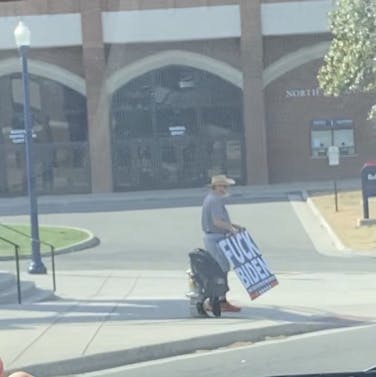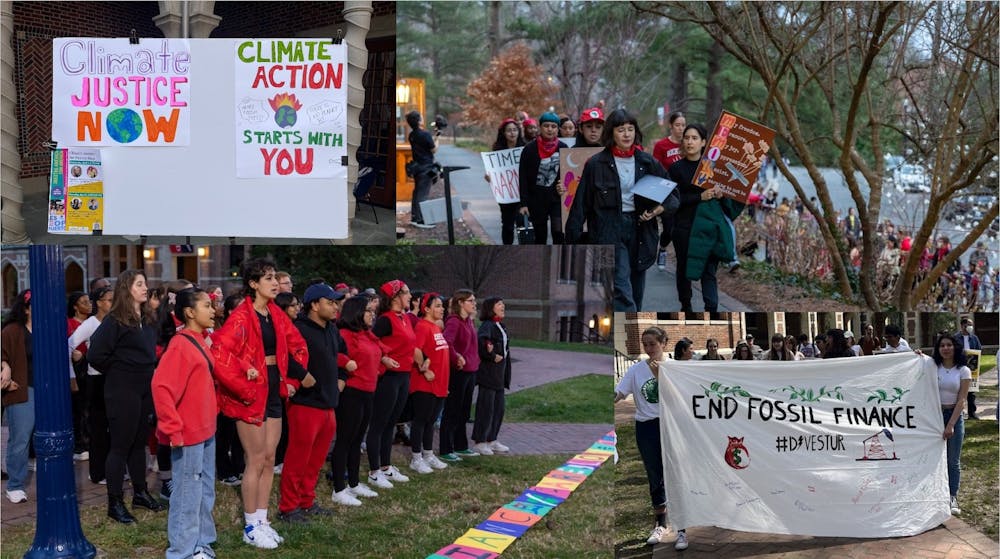Multiple demonstrations took place at the University of Richmond this year including protests against racial and gender violence, marches in favor of divestment and armed picketing against Joe Biden.
While organized student protests differ from armed outside demonstrations, these events bring up questions about the legality of protesting on a private campus.
One notable protest was on March 2, when students gathered in front of Richmond Hall to protest racial and gender violence in a demonstration organized by the Department of Latin American, Latino and Iberian Studies. The protesters wore red to represent their solidarity with survivors, chanting and locking arms in protest.
Another was organized by GreenUR to demand that UR divest from fossil fuel companies. Students chanted about the danger of fossil fuels while marching around campus on March 25.
Protest is a form of speech that is protected under the First Amendment, law professor Jack Preis said. However, UR can restrict the right to protest because it is a private university.
“You have basically no rights to protest,” Preis said. “When I say rights, what I mean are rights protected by the government.”
Because public universities are required to follow the Constitution, they cannot restrict the First Amendment rights of their students and faculty to speak freely.
“Your protest rights at a public university are going to be a question of time, place and manner,” Preis said. “If essentially, you're completely unable to protest, then you've got a constitutional violation.”
While private universities are not legally obligated to protect the right to protest in the same manner as public universities, many choose to do so anyway. While some private universities pledge to follow First Amendment law as if they were public schools, they have the right to do away with those protections at any time, Preis said.
UR has decided that because free speech, including protest, is an important part of pursuing knowledge, it will generally allow demonstrations, Preis said. However, UR may restrict the time, place and manner of a protest.
“Managing the complexity of competing viewpoints is core to the academic mission,” Law Professor Mary Tate wrote in an email to The Collegian. Because of this, universities will often be the location of protests, she wrote.
Organizers of a protest must register their demonstration with the UR Events Office at least 48 hours ahead of time, reserve a space and abide by state and local laws, according to the policy on the UR website.
Enjoy what you're reading?
Signup for our newsletter
Protests involving false or defamatory statements are not protected on private or public campuses, and most private colleges do not allow personal attacks, Preis said.
Another protest took place on Feb. 10 when an armed man stood outside the Robins Center. He waved at passing cars and was photographed by several students. The man wore a backpack and a heavy vest and appeared to be videotaping himself.
The man stood on College Road, which is public property owned by Henrico County, but covered UR’s Robins Stadium sign, which is owned by the university, with another sign that said “Fuck Biden.”

Armed protestor outside of the Robins Center on Feb. 11.
Demonstrators returned to campus Feb. 11. Several protesters stood outside the E. Claiborne Robins Stadium with signs, Ciara MacMullen, a first-year student who observed the protest, said. The largest sign, which they attached to the Robins Stadium sign, said “Fuck Biden,” she said. UR police watched but did not intervene in the protest.
An email from the University of Richmond Police Department on Feb. 11 informed the campus community that there might have been armed protesters on campus later that day. A person outside the Robins Center was armed during the demonstration that afternoon.
“Virginia is an open-carry state,” URPD wrote. “It is lawful for individuals over the age of 18 who can legally possess a firearm to do so as long as they do not come onto campus property. Firearms are not permitted on the University of Richmond campus.”
While guns are not allowed on campus, protesters have the right to carry weapons openly on public property, Preis said. If a demonstrator stood on River Road with a weapon, the school would not have the right to intervene unless the person acted in a threatening manner.
“When you use a gun in a threatening manner, so if he actually pointed it at people, then you've got a problem, the police can intervene,” Preis said. “Simply carrying the gun would not be sufficient to trigger any legal liability or grounds for interfering with their protest.”
Although URPD could not intervene in the protest on public property, some students observed protesters covering signs that UR owns.
“People that were driving by and walking by kept going up to the cops being like ‘hey, can you do anything about it?’ And they were like, ‘No, it's public property,’” MacMullen said.
MacMullen asked one officer why URPD allowed the demonstrators to cover the sign that belonged to the school, and URPD said they could not do anything to disrupt a protest on public property, she said.
‘It just didn't make sense to me that they were allowed to protest using the school signs and in front of the school like that,” MacMullen said.
URPD did not respond to a request for comment.
Although the sign contained a personal attack, their demonstration was protected by the First Amendment because Joe Biden is a public figure. The standard on what can be said about public figures is more permissive to protect the public’s right to criticize them, Preis said.
“It could be a lot more mean and graphic than that,” Preis said. “It can be really nasty stuff.”
Because the protest occurred on public property, Preis said that UR did not have any right to intervene. The exception to this rule would be if the protest significantly impacted university operations, like if a picket line prevented students from getting to classes, he said.
Some of the protests may have made some students feel unsafe, MacMullen said.
“I feel like it probably made students of color feel very unsafe,” MacMullen said. “[The protester’s] ideals are not very supportive of people of color and diversity and everything like that. So it definitely made me feel uncomfortable.”
Today’s campus culture sets the tone for a clash of ideas, with universities being diverse and influential communities, Tate wrote.
“In the polarization that broadly defines our political era in American history, campuses will necessarily be loci of that polarization,” she wrote. “Quite naturally, people in society outside higher education see campuses as a place to attempt to shape culture and values.”
Contact The Collegian at collegianstories@gmail.com
Support independent student media
You can make a tax-deductible donation by clicking the button below, which takes you to our secure PayPal account. The page is set up to receive contributions in whatever amount you designate. We look forward to using the money we raise to further our mission of providing honest and accurate information to students, faculty, staff, alumni and others in the general public.
Donate Now



